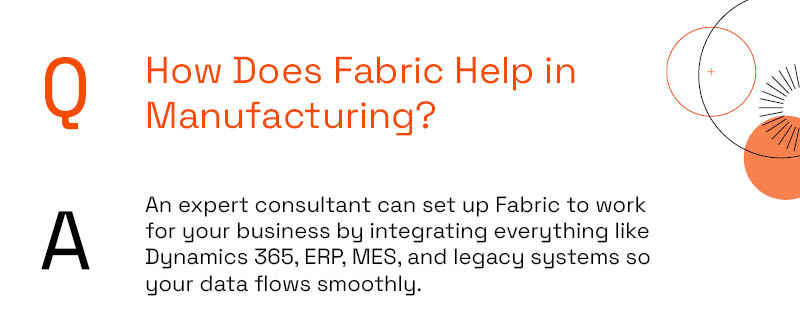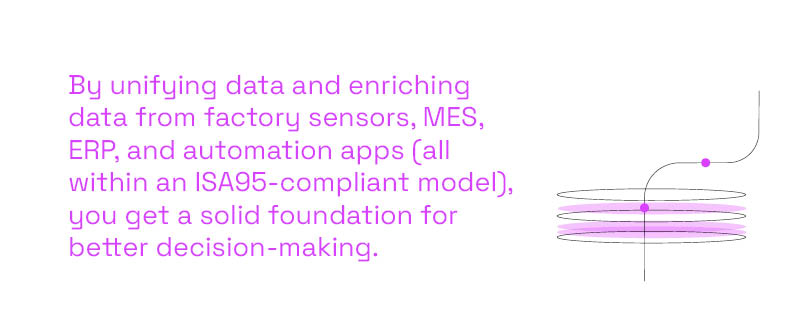
What Is Microsoft Fabric?
Ever dream of having all your data in one place and ready to deliver insights without the usual headaches of managing multiple tools and platforms? Well, dream no more—that’s what Microsoft Fabric offers. No more jumping between services for data movement, processing, and reporting; Fabric simplifies the data journey by unifying everything into a seamless, user-friendly software-as-service (SaaS) experience.
However, to make the most of Fabric, partnering with a Microsoft Fabric consultant can make all the difference. They’ll ensure that your business is set up to take full advantage of its capabilities, optimizing data management and AI-driven insights.
Microsoft Fabric also offers industry-specific data solutions that help businesses manage, analyze, and improve decision-making. These solutions are designed to tackle unique challenges so you can improve operations, integrate data from different sources, and leverage powerful advanced analytics. For manufacturers, the Microsoft Cloud for Manufacturing data solutions in Fabric (preview) provide everything needed to bring together and analyze their data all in one place.
No matter what size business you have, Microsoft Fabric streamlines the process of turning your raw data into useful actionable insights.
Key Components and Functionalities
Microsoft Fabric offers a powerful set of tools, but unlocking their full potential requires more than just knowing what each one does. Data consultants work with manufacturers to translate these components into strategic solutions that align with your business goals, data maturity, and technical environment.
Here’s how:
- Power BI
Consultants use Power BI to build reporting frameworks that reflect your business logic and key performance indicators (KPIs), making it easy for your teams to access insights and act with confidence. - Data Factory
Consultants design automated pipelines that move and transform data from your ERP, production systems, and external sources—eliminating data silos and manual work. - Real-Time Intelligence
With proper training and experience, consultants use their expertise to help identify meaningful signals, configure alerting and automation, and integrate real-time insights into your data driven decision making processes. - Data Engineering
Experienced consultants build Spark-based solutions that are scalable, efficient, and tailored to your workflows so your data infrastructure supports your growth. - Data Science
Expert consultants scope and deploy machine learning models that solve real business problems—from demand forecasting to quality prediction—and bring those outputs into everyday reporting. - Data Warehouse
Data Consultants create warehouse architectures that match your needs for performance, scalability, and governance while keeping data accessible to your teams. - OneLake
Consultants organize and configure OneLake as your unified data source of truth with the right access controls and structure to support enterprise-wide collaboration. - Copilot
Experienced consultants tailor Copilot to your environment so that its suggestions and automation features align with how your teams work.
Microsoft Fabric brings so many tools to the table to help manufacturers streamline operations, optimize supply chains, and analyze quality metrics. But having the tools isn’t enough. You need the right setup and strategy to turn raw data into real value. A Fabric consultant will configure Fabric to fit your specific manufacturing workflows, ensuring data is properly structured, accessible, and actionable.
In addition to the tools we’ve mentioned, Fabric integrates with Microsoft 365. A consultant will set up that integration to ensure smooth data flow across Excel, Teams, and Power BI. Looking to explore AI and machine learning? A Fabric consultant will leverage Fabric’s built in Azure AI Foundry for predictive maintenance or demand forecasting. In short, they’ll help you make the most of Fabric’s powerful capabilities.
How Does Fabric Help in Manufacturing?
Manufacturers are drowning in data from sensors, machines, apps, and even human input. But with most of that data scattered and unstructured, getting a clear picture of operations is a struggle, and using data to drive innovation, even harder. A Microsoft Fabric consultant will come in and help you turn that data into insights that drive decisions.
Microsoft Fabric platform provides the tools necessary to bring all your IT and operational technology data together. An expert consultant can set up Fabric to work for your business by integrating everything like Dynamics 365, ERP, MES, and legacy systems so your data flows smoothly. They’ll help you tap into real-time analytics and use AI-driven insight to help monitor production, predict maintenance needs, and optimize performance. Beyond connecting systems, a Fabric consultant helps you move from reactive to proactive decision-making. They help you configure dashboards, alerts, and automation tools that are tailored to your needs, ensuring the right data at the right time. Plus, with a scalable data strategy, Fabric grows with your operations to gain a long-term competitive advantage.

What Are the Benefits of Microsoft Fabric?
Microsoft Fabric shakes things up in manufacturing. The tons of data generated from machines, IoT sensors, and PLCs are constantly churning out numbers, and without the right tools, it’s like trying to drink from a firehose. A Microsoft Fabric consultant will help you cut through data complexity and turn insights into action. For example, by integrating data from IoT devices and quality control systems, they make it easier to spot and fix defects, improving product quality.
A consultant can set up AI-driven predictive maintenance to help catch potential failures before they cause costly disruptions. Plus, connecting Fabric with ERP and supply chain data systems gives real-time visibility into inventory, logistics, and demand forecasting. And with automated data processes, IT teams can focus on innovation instead of getting bogged down in maintenance.
Even better, Fabric scales and adapts to fit your manufacturing needs, taking the pressure off your team. No more trying to piece data together, spending time deciphering mismatched reports or making decisions based on your gut. Microsoft manufacturing data solutions make factory operations run much smoother by pulling all that scattered data into one place—teams solve issues faster, and users can interact with data in natural language (because who has time for complicated queries?)
What about my current systems? A Fabric consultant will integrate Fabric with your existing manufacturing systems without the need to rip everything out and start over. Fabric connects the old with the new using data connectors, APIs, and ETL/ELT processes, bringing all your data into a modern, AI-powered platform. It plays nice with top industrial apps, too, so everything works together seamlessly. Plus, integration with Microsoft Dynamics 365 creates a powerful team to monitor the entire manufacturing process and enhance the overall inventory management of your plant. Fabric even keeps an eye on your legacy system’s performance, offering predictive insights so you can decide what to modernize first.
Microsoft Fabric supports hybrid setups, letting old and new systems work together—no downtime, no disruptions, and no panic attacks. Whatever approach you’re ready to take, a Microsoft Fabric consultant will come in and work with your team to decide on the best route, help to integrate it properly, and get your business future-ready.
What is the Data Factory in Microsoft Fabric?
Data Factory in Microsoft Fabric is like your personal data traffic controller, pulling in data, prepping it, and transforming it to gain insights. But to make it work, you need the right setup. A Fabric consultant will help with that. A consultant will design custom data pipelines, automate refreshes for real-time analytics, and use Fast Copy to speed up data movement. They’ll also set up real-time triggers so you get instant insights into production performance and equipment health—no more waiting for reports.
With a consultant’s expertise, you’ll get streamlined data integration and optimized workflows so you’re always working with the most up-to-date data. Plus, with real-time insights on production performance, equipment health, and supply chain movement, you’re empowered with faster problem-solving, better forecasting, and the ability to catch inefficiencies before they turn into expensive headaches.
Impact on Real-Time Manufacturing Analytics
Manufacturing data solutions in Fabric are all about speeding up getting valuable insights from your data. By unifying data and enriching data from factory sensors, MES, ERP, and automation apps (all within an ISA95-compliant model), you get a solid foundation for better decision-making. And with built-in Microsoft and partner connectors, you’re covered no matter what system you’re using.
A Fabric consultant has the knowledge to build reports and models to leverage Fabric’s Real-Time Intelligence. Those expert-built models and reports help everyone on your teams analyze large, time-sensitive data right away. So if a sensor picks up an anomaly or a production delay happens, you’ll know instantly. Plus, with Data Activator, a consultant can automate responses based on triggers like temperature spikes or equipment issues, keeping operations smooth and proactive. You can stop waiting on reports and get real-time insights when it matters most.

Conclusion
Microsoft Fabric is like a superpower for manufacturers, bringing all your data together in one platform. It connects everything from factory sensors to ERP systems such as Microsoft Dynamics 365, letting you analyze and act on data in real time. Tools like Real-Time Analytics and Data Activator help you quickly spot issues and automate responses. It’s scalable, integrates with your existing systems, and helps you improve efficiency and unlock key benefits of digital transformation.
A Fabric consultant will help you unlock Fabric’s full potential. They’ll create a solution that’s aligned with your goals, help streamline integration, and customize it for your unique manufacturing needs. From strategic planning to training your team, a consultant will ensure a smooth rollout with minimal disruptions and maximum ROI.
At P3 Adaptive, we offer custom training solutions that are tailored to the needs of your business. If you’ve been exploring a Microsoft Dynamics 365 manufacturing demo, we can take you beyond the demo, connecting the dots between what the platform can do and how it will work in your business.
Ready to take your manufacturing operations to the next level? Together, let’s explore how Microsoft Fabric can streamline your data and give you a real-time, overall view of every part of your business. When you use Microsoft Fabric in manufacturing, the future is bright—our expert consultants will show you how. Let’s talk!
Get in touch with a P3 team member